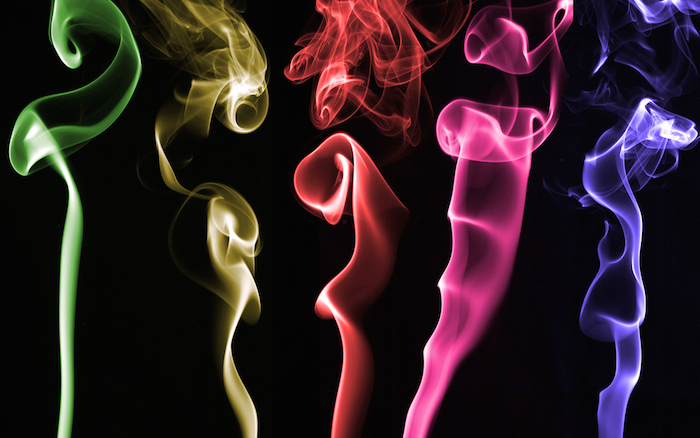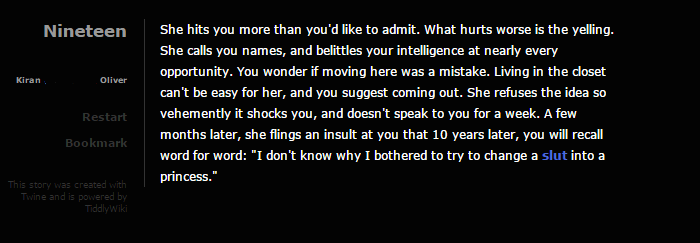Things Left Unspoken: Erasure in Online Discussion of Domestic Violence
In speaking about domestic violence online, we must be inclusive of those that do not fit the traditional narrative.
Trigger Warning: Domestic violence, mentions of violent actions, physical abuse, sexual assault.
When people hear the words “domestic violence,” they don’t usually think of how it affects queer people. When I was 18, I had already been involved with an abuser for 2 years. Against my better judgement, I spent my inheritance and moved to California. I turned 19 among my abuser and her family, and soon learned the truth of who I’d moved 3,000 miles to be with. She was physically, sexually, verbally, and emotionally abusive. I have PTSD, and many physical scars from her abuse. My second partner was also abusive, and our fights were verbal and highly physical. To fight someone to survive is exhausting. Physical fighting against people you care about, or claim to care about you — is draining. It tires you out every time you duck a blow.
The queer community still doesn’t have accurate statistics on domestic violence within it. In 2013, the CDC released the results of a 2010 study on victimization by sexual orientation, and admitted that “little is known about the national prevalence of intimate partner violence, sexual violence, and stalking among lesbian, gay, and bisexual women and men in the United States.” Note the wording there. There’s no mention of abuse statistics for those like me: trans individuals.
My first abuser was a cisgender lesbian woman. The second was a transgender man. I have identified as trans most of my life, once I knew there were words for what I was. I don’t know if my identity had anything to do with it (though on my darker days struggling with the after-effects of this abuse, I assume it did), rather than these individuals just being trapped in a cycle they couldn’t get out of. Even now, I appreciate trigger warnings on viral Facebook memes that depict domestic violence. I couldn’t watch the Super Bowl commercial everyone talked about this year — because I did that exact same thing to stop myself from getting murdered by an abuser in 2006.

Trigger warnings are used to inform people reading that they may be triggered by information contained within your message. Triggering can have an effect similar to an anxiety attack. One may find themselves experiencing flashbacks, shortness of breath, a fight-or-flight response, or severe emotional distress. This is not true for all triggered individuals. Others may feel a lurking sense of foreboding, or gnawing discomfort. Online, the practice of trigger warnings has gotten twisted and mocked to the point where it is hard to grasp its original intent. Shockingly, Tumblr is the only website where you can block tags — which is at least a way for people to avoid triggers. On Twitter, there is no way to effectively trigger-warn save for using valuable tweet space to do so — or sending multiple tweets.
Social media platforms could better support victims and survivors by allowing users the ability to mute keywords/phrases, hide things they don’t wish to see, and tailor their social media and content feeds to support what they need from their experience. Allowing users to control how information is presented to them, including how they avoid it, is crucial.
Meanwhile, I have had people come into my timelines — which are locked accounts where I control who I follow and what I would like to see in my feed — using triggering language. When confronted with their error, the person in question tends to reply that they are a survivor and get to use the language without a trigger warning. I am a survivor, and I still use trigger warnings. Doubly so if I’m barging into conversations and derailing them with my language. But fear culture and gaslighting online has reached a point that if you call someone out that uses triggering language, you are often attacked and piled on for not considering their needs — rather than them having to pause and consider yours.
Online, gaslighting is another constant for many domestic abuse survivors. On Twitter, many tweets can be deleted in a fraction of a second. This results in long discussion threads where it looks like users are talking to themselves — when in reality what you’re probably seeing is someone that is being gaslit. Deleting tweets to make yourself look better after someone points out that you’ve misstepped is an awful thing to do. It erases the person that was addressing you, and makes them appear to be shouting into the void. They will wonder for weeks if they were “just overreacting” or if half of their social circle thinks they were “wrong to address the issue.” For me, this often occurs when I call people out for misgendering me. I recently had a very draining debate with Kameron Hurley on the subject, and as a result? She deleted her tweets. I have been suffering the lingering effects of gaslighting for the better part of a week. As a trans person, I don’t think that asking to be treated with respect is too much to ask.
Many protest ‘call out culture’ and state that it has gotten toxic online. A pile-one is usually seen when many, many people invade a person’s social media space and attack them. This can be seen in @ mentions on Twitter, or anonymous messages on Tumblr. The pile-on is usually negative, with users subject to hate speech and derogatory statements about their character. There is a hive-mind involving pile-ons if one is part of the majority that is doing the piling-on, where it’s the community that initiated the pile-on trying to get everyone else to see that they are “right,” whereas everyone else as inherently wrong. It has gotten to the point where many marginalized individuals are afraid to speak up about their experiences, for fear of being piled-on by those with more privilege than they. It essentially turns into those with structural power ‘talking down’ from their self-appointed high horse to those they deem have affronted them.
There’s a huge push to “Call it in” or “Speak privately” rather than to call out. This is insidious for those that are trans or members of a marginalized community calling out our oppressors. “Calling it in” can be dangerous in that meeting someone you don’t know can be dangerous, especially if they have already shown themselves to be abusive. Nobody has a right to tell people how to react to or address their own oppression. If you want to call someone out, it’s well within your right to do so. We need to stop shaming marginalized community members for calling out people when they are misgendered, when they are treated badly by others, or are the target of oppressive actions or speech by those in positions of privilege over them. There should be no “calling it in” when it comes to misgendering, oppressive, or transphobic actions.

Screenshot from ‘Nineteen.’
I have made two games in Twine that detail my experience with abuse, domestic violence, and homelessness. They are called Nineteen and Twenty, and available to play on itchio. Nineteen details my move to California, the abuse I suffered, and the beginnings of my social transition. Twenty discusses my second abusive relationship, beginning HRT, and the reality of being homeless. Making tiny Twine games allowed me to speak about that part of my life freely. I can’t talk about what happened to me among my friends, or my family. The people that know the most about the things that have happened to me are my fiancee, and my friends that I have met on the internet. Creating games has helped me to achieve some level of power over my life, and to tell my story in the hopes that it will help others.
In speaking about domestic violence online, we must be inclusive of those that do not fit the traditional narrative. Make your discussions inclusive by removing gender binary wording from your statements, and taking care to listen, rather than talk over survivors that share their experiences with you. Together, we can share our stories, create better trigger warning culture, and know when “calling it in” is appropriate.
I am just one queer trans person, but I am a survivor of domestic violence. There aren’t any statistics on me in CDC research that forgets to mention transgender people, but now — maybe there will be.


